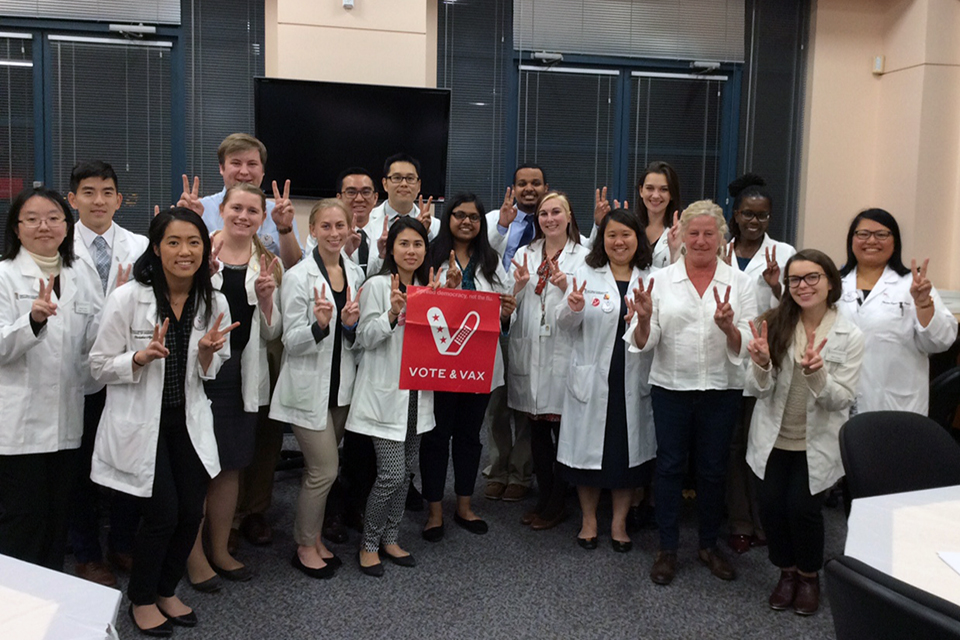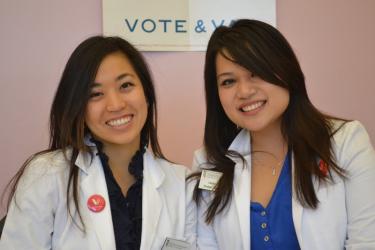SOP Hosts Renowned Advocate for Pharmacist-Delivered Immunizations
John Grabenstein, RPh, PhD, visits the School of Pharmacy to speak about immunization advocacy and his career-long efforts to educate and train pharmacists to provide this valuable service.
By Malissa Carroll
February 19, 2013
On Monday, Feb. 4, the American Pharmacists Association Academy of Student Pharmacists (APhA-ASP) and the Phi Delta Chi Professional Fraternity hosted a joint forum featuring a presentation by John Grabenstein, RPh, PhD, executive director for vaccine medical affairs at Merck & Co., Inc. An untiring advocate for the role of pharmacists to provide immunizations for patients, Grabenstein wrote the original curriculum for “Pharmacy-Based Immunization Delivery,” a 20-hour continuing education course coordinated by the American Pharmacists Association and recognized by the Centers for Disease Control and Prevention (CDC).
“There are a lot of medications for which you will someday be responsible. Many of these medications will provide cures or treatments for a wide range of illnesses,” Grabenstein began. “However, the drugs that I am most proud of and most thankful to have in our society are the drugs that prevent disease and infection in the first place – vaccines.”
Before accepting a position leading medical affairs and scientific policy at Merck, Grabenstein served as a colonel in the United States Army. After receiving his pharmacy degree from Duquesne University in 1980, he was stationed at Walter Reed Army Medical Center, where one of his responsibilities was managing the immunization clinic. Later, Grabenstein directed the Military Vaccine Agency, which oversaw immunization programs for 9 million troops, retirees, and their family members across four continents and numerous ships at sea. His efforts to educate and train pharmacists to provide immunizations, as well as his advocacy on behalf of the profession, have had an impact nationwide.
“When I first began my career, I had no idea where it would take me,” said Grabenstein. “It’s important to be alert, have your eyes open, and have a network. There are very few professions that offer the range of opportunities that pharmacy does.”
Grabenstein traced the relationship between pharmacists and vaccine advocacy to the 1890s, when pharmacists worked as product distributors to deliver diphtheria antitoxin and smallpox vaccine. Nearly a century later, in 1984, nurses started visiting pharmacies to provide vaccinations to patients. Grabenstein noted that Washington was the first state to train pharmacists to administer vaccines.
“After Washington started to train pharmacists to deliver vaccines, everything happened quickly,” said Grabenstein. “Within three years, the number of pharmacists trained nationwide by the APhA, state associations, and colleges to deliver vaccinations increased from 80,000 to 175,000. We were helping to meet the public health need, helping unvaccinated people get vaccinated.”
Depending on the state in which a pharmacist practices, Grabenstein noted that legal constraints might still exist that preclude the pharmacist from administering vaccines directly to patients. He remarked that students should not get discouraged. “If the setting where you work cannot administer vaccines for whatever reason, you can still talk and be an advocate to patients. Have those personal conversations with patients and encourage them to visit their doctor’s office and get vaccinated,” said Grabenstein.
He also encouraged students to be proactive as pharmacists and work with partners outside the profession to help reduce the burden of vaccine-preventable diseases.
“Do pharmacists know the people who need vaccines? You bet. Who sees the diabetic patients? Who sees the lung disease patients? Who sees the heart disease patients? You do. Every one of those encounters is an opportunity to check which vaccines those individuals have received and encourage them to get those vaccines they might have missed.”
To conclude his presentation, Grabenstein offered heartfelt words of advice to the School’s student pharmacists as they prepare to enter the profession.
“Maybe infectious diseases is not a field in which you’re particularly interested. Whatever your field of interest is, be passionate about it and figure out how you can provide the best care possible for your patients,” said Grabenstein. “Whether you’re in community pharmacy, institutional pharmacy, or industrial pharmacy, do what you enjoy and be passionate about knocking down barriers and doing things nobody else has ever done.”
This forum was part of APhA-ASP’s Professionalism Series Lectures, which bring pharmacy leaders to the University of Maryland School of Pharmacy to provide insight, motivation, and inspiration to student pharmacists.
“It is my hope that everyone who attended this forum will walk away inspired,” said Jamie Elsner, third-year student pharmacist and APhA-ASP chapter president. “Whether you are a member of the faculty, student body, or staff, I hope that this forum served as a spark to ignite an opportunity for you to make your mark in the pharmacy profession.”
Following the forum, Grabenstein met with faculty members and staff from the Maryland Pharmacists Association to discuss ongoing immunization efforts in the state of Maryland.


